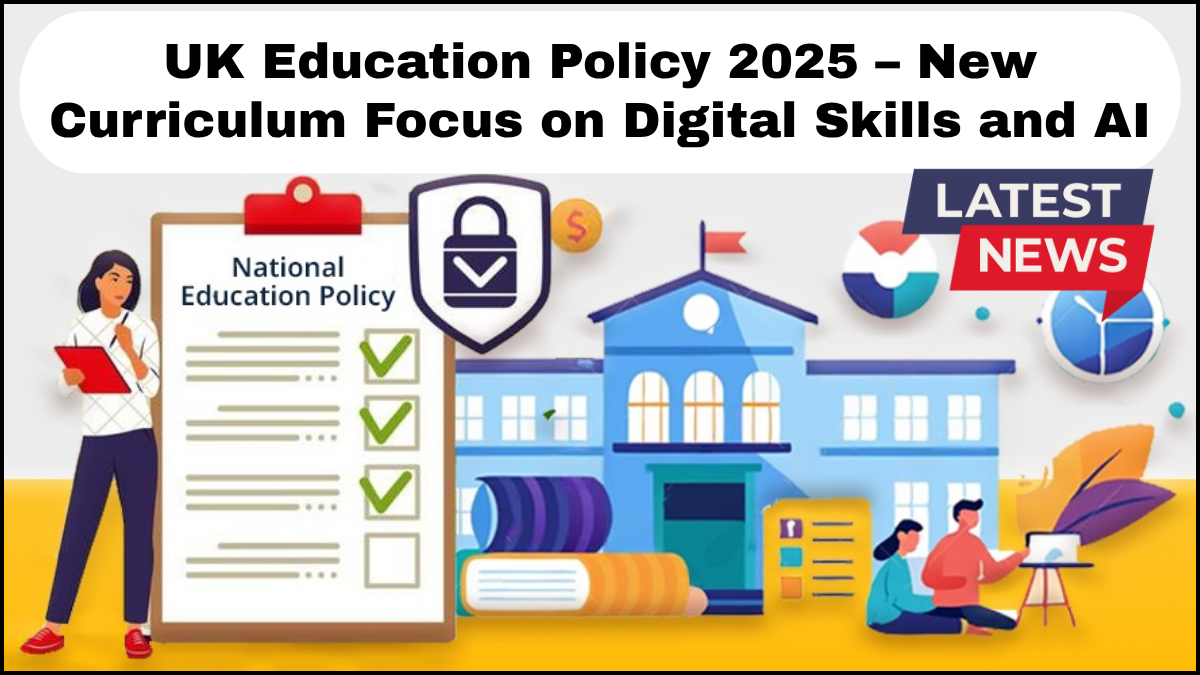In 2025, the UK education system is undergoing a significant transformation aimed at aligning schools with the realities of a rapidly evolving digital economy. The latest UK education policy changes 2025 mark a decisive shift in educational priorities, with a major curriculum overhaul in the UK focused on equipping students with digital fluency and proficiency in artificial intelligence (AI).

A Strategic Shift Toward Future-Proof Learning
The 2025 policy reforms represent more than minor tweaks to the national curriculum. They signal a strategic realignment of education toward future-proof skills. Recognizing the disruptive impact of digital transformation across sectors, the Department for Education (DfE) has restructured learning objectives at all key stages to include coding, data literacy, cybersecurity, machine learning basics, and ethical implications of AI.
These changes are not limited to secondary education. Even primary schools will introduce age-appropriate modules that build foundational tech literacy, encouraging early familiarity with computational thinking and responsible use of technology.
Key Components of the 2025 Curriculum Overhaul
The curriculum overhaul in the UK encompasses several structural and content-level changes designed to integrate digital capabilities across all subjects rather than isolate them within ICT (Information and Communications Technology) classes.
1. Digital Skills Integration Across Subjects
Maths, science, humanities, and even the arts will include embedded digital competencies. For instance, geography lessons may involve data visualization tools, while history projects might require digital storytelling platforms or AI-assisted research methods.
2. Compulsory Coding and AI Modules
From Year 5 onwards, all pupils will learn the basics of programming languages such as Python and JavaScript. At the secondary level, AI literacy becomes a core component, including training on algorithms, natural language processing, and ethical use cases.
3. Focus on Real-World Application
Rather than teaching software in isolation, students will apply digital tools to solve real-world problems. Project-based learning will simulate industry scenarios—designing chatbots, analyzing public datasets, or creating web apps—bridging the gap between classroom theory and workplace relevance.
4. Teacher Training and Capacity Building
For the UK education policy changes 2025 to succeed, schools must also undergo operational transformation. A major investment has been made into teacher retraining programs. Teachers across the country are receiving upskilling support through digital certifications, AI boot camps, and peer-led workshops to ensure they can confidently deliver the new content.
Why This Change Matters
The UK’s competitive position in the global economy hinges on a skilled workforce capable of thriving in a digital-first world. By 2030, it’s estimated that up to 80% of all jobs will require some level of digital literacy. The policy shift ensures that students are not merely consumers of technology but active creators and informed critics.
This reform also aims to narrow the digital divide. The government is partnering with tech companies to provide resources, including laptops, broadband subsidies, and software access to disadvantaged students. Equity is a core focus—every child, regardless of background, must have access to digital opportunity.
Early Feedback and Industry Response
Tech industry leaders, including Google DeepMind and Microsoft UK, have applauded the curriculum changes. Many are already collaborating with schools to provide real-world mentorship and internship pipelines. Some universities have also aligned their entry requirements and first-year modules with the new school curriculum to ensure continuity in learning.
However, educational unions have voiced concerns about rollout timelines, workload pressure on teachers, and infrastructure gaps in rural schools. The DfE has responded by pledging phased implementation, pilot programs, and increased funding for school modernization.
FAQs
Q1: What are the main goals of the UK education policy changes 2025?
The primary goals are to modernize education, prepare students for a digital economy, and ensure all pupils gain essential digital and AI-related skills across subjects.
Q2: How does the curriculum overhaul in the UK affect primary school students?
Primary students will start learning basic digital literacy, coding logic, and responsible tech use, laying the groundwork for advanced learning in secondary school.
Q3: Will teachers receive support to adapt to the new curriculum?
Yes, the policy includes extensive teacher training programs, digital skill certifications, and additional resources to help educators implement the new content effectively.
Q4: Is AI education mandatory for all students?
Yes, from secondary school onwards, AI fundamentals—including how algorithms work and how data is used—are mandatory parts of the new national curriculum.
Q5: How will the reforms address inequality in digital access?
The government has committed to bridging the digital divide by providing devices, subsidized internet, and learning platforms to underprivileged students.
click here to learn more